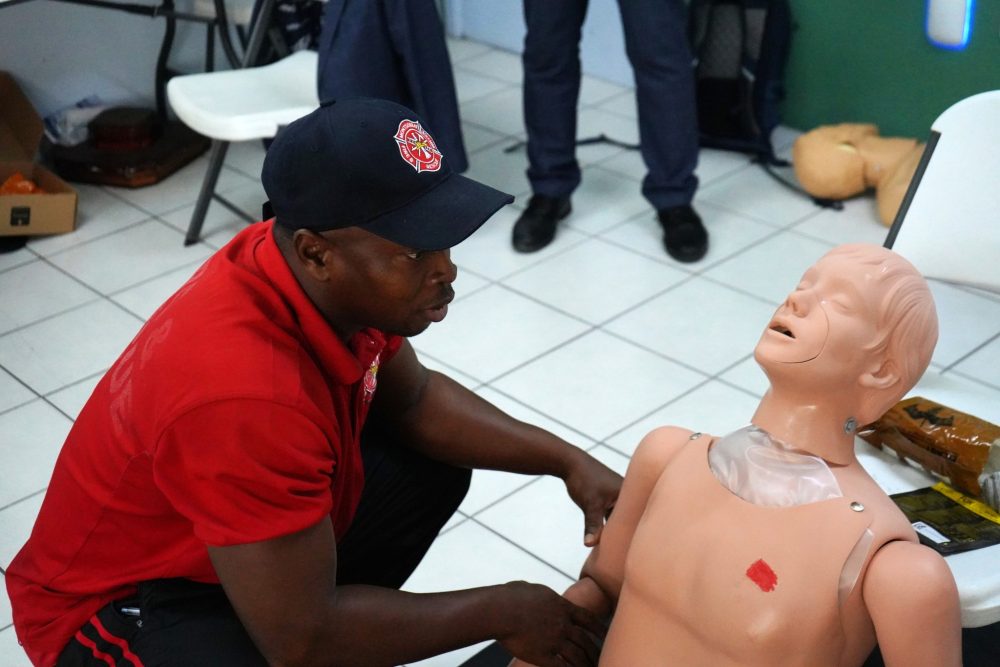Press Release – Joint Statement from the Healthy Caribbean Coalition (HCC) and the Organisation of Eastern Caribbean States (OECS) Commission
The Healthy Caribbean Coalition (HCC) and the Organisation of Eastern Caribbean States (OECS) Commission are concerned about the challenges to regional food security and accessing safe and nutritious food during, and beyond, the COVID-19 pandemic.
The Situation
 The COVID-19 pandemic threatens to undermine the gains made in recent years in the prevention and control of diet-related non-communicable diseases (NCDs), as well as the maintenance of good health among people living with NCDs. Population-based COVID-19 control measures are creating environments conducive to significant dietary shifts away from fresh produce towards non-perishable, energy-dense, nutrient-poor, processed and ultra-processed foods high in fats, salt, and sugars.
The COVID-19 pandemic threatens to undermine the gains made in recent years in the prevention and control of diet-related non-communicable diseases (NCDs), as well as the maintenance of good health among people living with NCDs. Population-based COVID-19 control measures are creating environments conducive to significant dietary shifts away from fresh produce towards non-perishable, energy-dense, nutrient-poor, processed and ultra-processed foods high in fats, salt, and sugars.
The ‘Big Food’ industry is thriving, including fast food chains and quick-service restaurants which are adapting rapidly in order to meet growing demands for non-perishables and instant ‘lockdown’ meals. While acknowledging the potential contribution and value of the private sector, we must proceed with caution in light of increasing concerns that food and beverage industry giants may exploit current vulnerabilities to promote non-perishable, energy-dense, nutrient-poor, processed and ultra-processed foods high in fats, salt, and sugars.
The loss of nutritious meals by tens of thousands of children who benefit from national school meals programmes is another casualty of the COVID-19 pandemic in the Caribbean, a region already on a dangerous trajectory towards crisis levels of overweight and obesity. The COVID-19 crisis jeopardizes recent modest successes in this area and has the potential to give rise to post-pandemic surges in overweight and obesity among children and in the population at large.
These COVID-19-related threats to the diets of Caribbean people are further exacerbated by the regional droughts and an anticipated above-average hurricane season, examples of the climate crisis that is also impacting the region.
There is an urgent short-term and long-term imperative to develop and strengthen healthy, resilient, and sustainable regional food systems through increased domestic production and trade. Consumption of healthy diets consisting of domestically sourced fruits and vegetables and some animal products, such as fish and chicken, is critical for immune strength and requires the ability of local and regional supply chains to meet these needs. Small scale producers are currently trying to fill these gaps, but we are only at the beginning of this crisis and the demand will grow. As the COVID-19 pandemic spreads, global food supply chains which are currently stable may begin to see disruptions. As a significant net importer of food, with some countries importing 90-95% of what they consume, the Caribbean region is particularly vulnerable.
HCC and OECS Commission Responses
- HCC
On February 28th 2020, following the 31st Inter-Sessional Meeting of Caribbean Community (CARICOM) Heads of State and Government, the HCC published an Open Letter in support of CARICOM’s call to reduce the regional food import bill by 25% and urged governments to use the action as an ‘entry point for a movement away from imported processed foods in favour of regionally produced healthy agricultural products.’
On March 27th 2020, the HCC published an Open Letter to CARICOM Heads calling for ‘urgent action to protect those living with NCDs from COVID-19’, including the implementation of policies and programmes which ensure access to healthy foods. These measures are critical to protect the most vulnerable citizens, including those living with underlying conditions such as NCDs, which worsen the impact of COVID-19.
On April 6th, 2020, the HCC launched a COVID-19 Communication Strategy to guide the organization’s advocacy and communication during the COVID-19 pandemic. One of the five objectives of the strategy is to ‘Promote access to, and consumption of, healthy foods’.
- OECS Commission
Working concurrently with the CARICOM Secretariat, the OECS Commission has opted to coordinate harmonised national and regional responses to the potential threats to food security presented by COVID 19. The OECS Member States have been mobilised to develop their National Agriculture Sector COVID-19 Response Strategies and facilitate the intra-regional trade of the excess supply of fresh produce generated from intensive production over the foreseeable future. At the core of this two-pronged strategy is the thrust to utilise nutritious, locally produced and culturally appropriate foods to stabilise the food market and, by extension, regional food security.
At the national level, St. Vincent and the Grenadines has taken the lead on this effort, developing and implementing its “Coronavirus Food Security and Impact Mitigation Plan” at the beginning of March 2020. In addition to commercial production, the country has been actively promoting backyard gardening and the consumption of immune system-boosting foods. Similar measures are also being taken in Dominica, where heavy investments have been channelled into the production of short-term crops, livestock, and fisheries. Other Member States have disclosed stimulus packages where agriculture is cited as priority area and are in the process of finalising their response plans.
Working with both the CARICOM Secretariat and Member States’ nationally appointed Agriculture focal points, the OECS Commission has undertaken an approach that harmonizes national responses into a cohesive and coordinated regional effort.
As part of the response strategy, the Commission has embarked on the creation and coordination of a working group of Agriculture Focal Points, with the following objectives:
- To provide a forum for regional discussion and to share best practices and expertise regarding the formulation a food security response to the COVID-19 pandemic;
- To formulate a cohesive regional food security response to the COVID-19 pandemic;
- To collaborate in periodic reviews of the impacts of the formulated food security responses to the COVID-19 pandemic in Member States; and
- To identify, and where possible facilitate, the trade and transportation of commodities and food to other Member States, if and when required.
The OECS Commission has resolved to translate the progress made as part of the COVID-19 response to achieve long-term food security and greater regional integration.
Our Joint Commitment
The HCC and the OECS Commission commit to leveraging our respective strengths, together with key partners, and building on existing initiatives, to ensure that food and nutrition security is given priority at national and regional levels, guided by policy development and framed by supportive environments. These efforts must go hand-in-hand with the focus on containment and mitigation of the impact of local COVID-19 epidemics.
There are narrowing windows of opportunity to plan and prepare. It is against this background that we commit to, and ask, the following:
- Civil society advocates, in partnership with the public and private sectors, develop and implement information and education campaigns to promote healthy eating based on local produce and domestically sourced animal products, and support programmes which promote and support domestic production and intra-regional trade.
- Governments include consistent and coherent food and nutrition security measures in their national COVID-19 response plans.
- Governments expand and improve emergency food assistance and social protection programmes.
- Governments, private sector, and civil society advocates be guided by, and promote where possible, the OECS list of ‘Essential Basket of Food Items for Vulnerable Groups during COVID-19’, including for emergency food assistance programmes and meal distribution to vulnerable populations and out-of-school children. Reference to an agreed-upon essential basket of healthy foods, compatible with national food-based dietary guidelines, will ensure national and regional consistency of messaging around dietary requirements
- Private sector entities in the processed and ultra-processed food and beverage sector making COVID-19-related donations of any kind, refrain from promoting product lines that are high in sugar, salt or fat, or exploiting opportunities to increase brand visibility and loyalty.
- Governments, private sector, and civil society advocates promote and support home or backyard gardening in the context of the broader regional and national food security strategy. Home gardening, as a small-scale production system, must be leveraged as an important supplemental source for contributing to household food and nutritional security and livelihoods. The HCC and the OECS Commission, with the involvement of the health and agriculture sectors, and the participation of both private and non-governmental organizations, are undertaking an extensive awareness programme and promoting the use of backyard gardening as part of the integrated approach to addressing food insecurity in a COVID-19 environment.
- Governments and private sector support smallholder farmers, fisherfolk, and fisheries to increase their productivity and market the food they produce, including through building capacity to utilise e-commerce channels.
- Governments and private sector support the repurposing of local produce and domestically sourced animal products destined for the now shuttered tourism markets, to reduce food insecurity among the most vulnerable.
- Governments and private sector invest in healthy, resilient, sustainable regional food systems across the supply chain from farm and sea to fork, including addressing and overcoming intra-regional trade barriers to allow for enhanced regional trade.
- International and regional health agencies continue their support, including the provision of technical cooperation, assistance, and guidance on the implementation of policies and programmes that ensure access to healthy, nutritious foods and the strengthening of food security in the region.
- Governments seek to identify and manage conflicts of interest in requesting the assistance of the private sector, as part of good governance.
The COVID-19 pandemic represents an opportunity for a paradigm shift in the Caribbean in the way we produce and consume food. The decisions taken over the course of the pandemic could positively reshape the regional food system or exacerbate unhealthy diets, especially in vulnerable groups, ultimately intensifying the NCD burden. It presents an opportunity for a regional approach to articulating the goal of maximum food security, and supporting sub-regional and national approaches for addressing the legitimate food self-security concerns among OECS Member States and the wider Caribbean Community. It calls for a focused, regional agri-food security response facilitated by OECS and CARICOM—a response articulated by, and agreed among, the Member States’ Ministries of Agriculture.
The HCC and the OECS Commission are committed to promoting and supporting systems that strengthen food and nutrition security in the Caribbean, prevent and control NCDs, and equitably maintain the health of Caribbean people. We will work with all of society and all of government to achieve this, as part of the collective response to the COVID-19 pandemic.
About the Organisation of Eastern Caribbean States:
The Organisation of Eastern Caribbean States (OECS) is an international organisation dedicated to economic harmonisation and integration, protection of human and legal rights, and the encouragement of good governance among independent and non-independent countries in the Eastern Caribbean comprising Antigua and Barbuda, Commonwealth of Dominica, Grenada, Montserrat, St. Kitts and Nevis, Saint Lucia, St. Vincent and the Grenadines, British Virgin Islands, Anguilla, Martinique and Guadeloupe.
About the Healthy Caribbean Coalition:
The Healthy Caribbean Coalition (HCC) was informally established in 2008, arising out of the 2007 Declaration of Heads of Government of the Caribbean Community (CARICOM) on non-communicable diseases (NCDs). The coalition was officially registered as a not-for-profit organisation in 2012. The HCC is the only Caribbean NCD alliance of over 100 health and non-health civil society organisations (CSOs) working closely with regional and international leaders in NCD prevention and control to leverage the power of civil society by strengthening and supporting its membership in the implementation of programmes aimed at reducing the morbidity and mortality associated with NCDs.
Discover more from Discover Montserrat
Subscribe to get the latest posts sent to your email.



